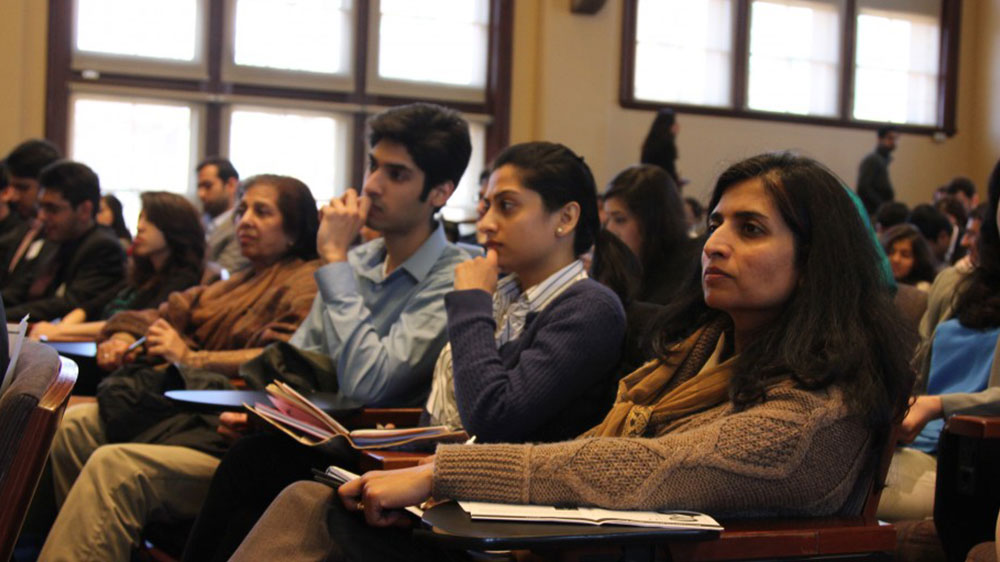Higher Education Commission (HEC) envisages increasing the number of PhDs from the current 11960 to 38400, gross enrollment from the current 9 percent to 15 percent, the number of universities from 188 to 300, enrollment from 1.348 to 3.8 million and PhD faculty from 26 to 40 percent by 2025.
While addressing a press conference on the occasion of HEC’s 15th anniversary celebrations, Dr. Mukhtar Ahmed, Chairman (HEC) gave an overview of Commission’s efforts for holistic development of country’s higher education sector. He said HEC has received Rs 336 billion under the Public Sector Development Program (PSDP) since 2002.
Dr. Mukhtar said HEC is committed to its role in developing a prosperous Pakistan through strengthening the basis for a knowledge economy.
He was accompanied by Dr. Arshad Ali, Executive Director HEC and Dr. Masoom Yasinzai, Rector, International Islamic University who is also Chairman of the Vice Chancellors’ Committee, and vice chancellors of local universities. While Vice chancellors and university representatives connected through video conferencing.
Briefing the media about performance of HEC since its inception in 2002, Dr. Mukhtar Ahmed said HEC started its journey with only 59 universities in the country, 2.6 per cent gross enrollment, 800 publications, and 3110 PhDs, adding that the number of higher education institutions has now reached 188 with nine per cent gross enrollment, 12000 publications, and 11960 PhDs. He said that 32 per cent female enrollment has now reached 48 per cent, as HEC is promoting equal higher education opportunities to maintain gender equity.
“So far, HEC has awarded over 251000 scholarships to Pakistani students including indigenous, overseas and need-based scholarships as well as Prime Minister’s fee reimbursement scheme.”
The Chairman said Pakistan emerged in 2016 as a country with highest percentage of highly cited papers as compared to BRIC (Brazil, Russia, India and China) countries according to a Thompson Reuters report entitled “Pakistan: Another BRIC in the Wall”.
He informed the media persons that 41 per cent of HEC funding goes to human resource development, 33 per cent to ensuring equitable access, 23 per cent to ICT development. He further said that HEC has allocated funds for construction of 505 academic blocks in universities, of which 357 blocks have been completed and 148 blocks are under construction. “HEC targets ensuring one institution in each district by 2019 without any compromise on quality of education,” he said.
Describing HEC’s steps for development of ICT infrastructure, he said HEC has set up Cloud Data Centre while connecting a large number of universities and colleges in Pakistani cities under Pakistan Education and Research Network. Sharing plans about PERN-III, he said the programme will mark expansion to new cities along with up-gradation of campus equipment with 10Gbps support.
Dr. Mukhtar said that for improving governance of higher education institutions, HEC won Global Good Governance (3G) Excellence in Higher Education Award 2016 and it has also clinched the 3G Award of Cambridge IF Analytica, an international organisation based in Cambridge, UK for 2017 too.
He said HEC plans four new education projects pertaining to Smart University Programme, Education Cloud and Services, PERN, and Higher Education Information Management System (HEIMS).
With regard to the HEC Vision 2025, the Chairman said HEC envisions consolidated higher education sector with enhanced equitable access, excellence in university leadership, governance and management, and increased research, innovation and commercialisation activities. He said HEC is striving hard to increase faculty in HEIs apart from improvement the quality of curricular content at all levels.
The Chairman also informed the media about the outcomes of establishing Offices of Research, Innovation and Commercialisation (ORICs), Business Incubation Centres, and Technology Development Fund. He also informed the media that the HEC has proposed establishment of NIAT (National Institute of Applied Technology) in order to accelerate the technology readiness.
To a question, he said HEC releases funds to universities without any delay. “No individual can influence the release of funds, as they are released through a formula based funding without any discrimination,” he stated.
The Chairman emphasized upon the private sector and philanthropists to play their role for promotion of the education sector. “HEC’s Government funding has reached Rs. 106 billion, however we cannot entirely rely on Government. Everybody needs to play a role in order to bring our higher education sector at par with that of the developed world,” he said.
Shedding light on some other initiatives, he said HEC has formed Online Attestation System and it has formulated National Qualifications Framework (NQF) and Pakistan Qualification Register (PQR) as a part of NQF in order to enable the students and their parents to make informed decisions. “Establishment of Education Testing Council is another initiative for ensuring quality of student intake in our higher education institutions.”
Referring to the latest developments, he said HEC has become a part of Washington Accord, adding that negotiations are underway about joining the Sydney Accord also.
To a question, the Chairman said that HEC in collaboration with universities is taking tangible measures to curb radicalization among students and staff of universities. “Though responsibility of dealing with the issue of extremism lies with all members of our society, including parents teachers, religious scholars but we in higher education sector are in contact with the university leadership to play our part.”
He said that 15-year celebrations will continue throughout the month. Universities will hold seminars and open-house activities in order to interact with the community and bring their achievements before the public. “All this aims to give the youth a hope for their future,” he said.
For more on HEC’s goals for 2025, check out their presentation here.


























Why is it that even after 70 years, pakistan is still using english as the primary language in higher education?
Increasing this sector will still mean education for a tiny proportion of the population that is familiar with this foreign language while the vast talent of urdu speakers is wasted.
To compete at the global level, you would need your people to be familiar with the globally recognized medium of communication.
Yes. We need people to speak foreign languages like English, Chinese, Javanese, French, spanish……
Using english medium means majority of population would be “illiterate”, duplicating the disaster the English created when they occupied this country.
What about poor biology students who want to get into universities?